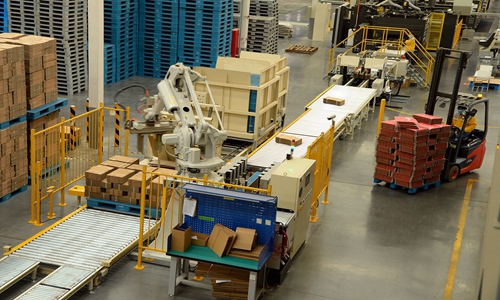China won’t be scared by Kudlow’s proposal
Source:Global Times Published: 2020/4/12 19:14:41

A robot arm helps pack components in a traditional manufacturing facility in Taicang, East China's Jiangsu Province. Photo: cnsphotos
The Trump administration appears to have tried desperately to grapple with the domestic economic emergency resulting from the COVID-19 pandemic. But it doesn't mean some proposals - like the one White House economic adviser Larry Kudlow had proposed - can be completely divorced from reality.When answering a question about how the US can reduce its reliance on Chinese manufacturing, Kudlow told Fox Business Network Thursday that the US could lure American companies to move back from China with full immediate expensing. "Plant, equipment, intellectual property, structures, renovations - in other words, if we had 100 percent immediate expensing, we should literally pay the moving costs of American companies from China back to the US," he said.
For Americans, getting US companies back to home may sound like a solution to their current economic downturn, especially after about 16.8 million people applied for unemployment benefits during a three-week period. Yet, those who buy in the proposal may overlook the fact that it is not feasible and won't really lure US companies back.
First, the proposal to pay for the moving costs is not attractive to US companies at all. If anything, the comprehensive manufacturing costs are much more expensive in the US than in China or in Southeast Asia.
Second, American manufacturers can hardly find enough skilled workers locally if they do move back.
Third, the availability of upstream and downstream supply chains in the US could pose another challenge for US companies moving back home.
Fourth, leaving China, to a certain extent, means companies need to cede China's massive consumer market to their rivals, which is obviously unacceptable.
Fifth, it is also unwise for companies to make such a relocating decision at a time when China has managed to bring the epidemic under control while the coronavirus continues to rage in the US.
Sixth, it is hard for the proposal to become an actual policy as American taxpayers will unlikely support the proposal.
In this sense, Kudlow's proposal seems more like a bluff, indicating that the White House would continue to pursue decoupling from China. But there is no need for China to panic about such a cliché decoupling threat.
Of course, the US may still be able to urge a return of part of its industrial chain, even if not all of the manufacturers will move back. But such industrial shifts, which go against globalization and basic capital flow rules, will only mess up the normal supply chains and end up hurting Americans' own interests.
Assuming the coronavirus pandemic would go on to rock the world in the coming one year or two, the probable manufacturing survivors must be those in China instead of in the US. After all, the Trump administration is still perplexing about how to safely reopen its economy right now.
Posted in: GT VOICE